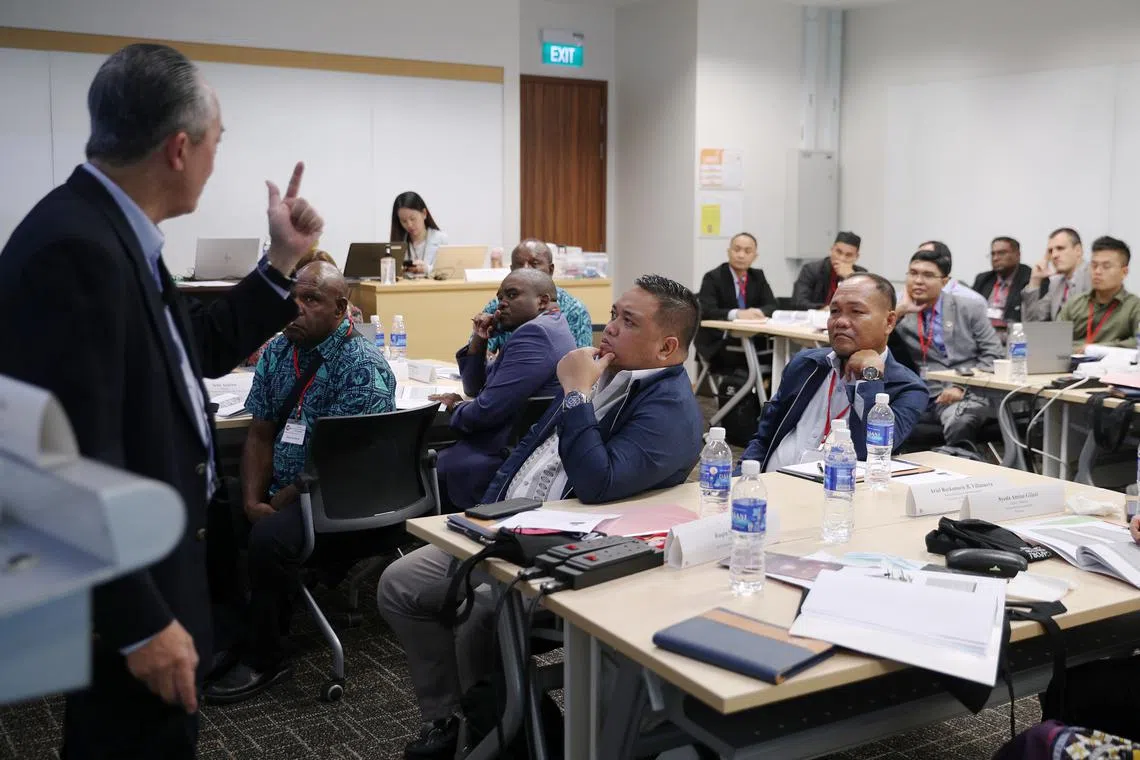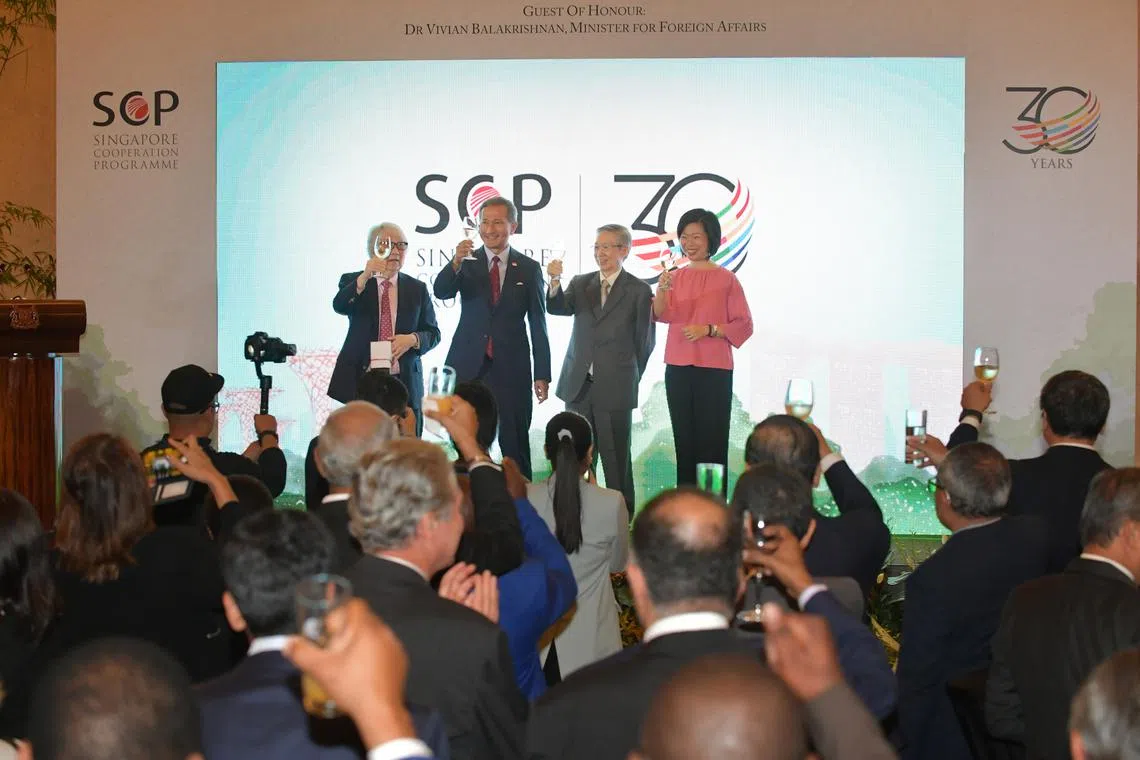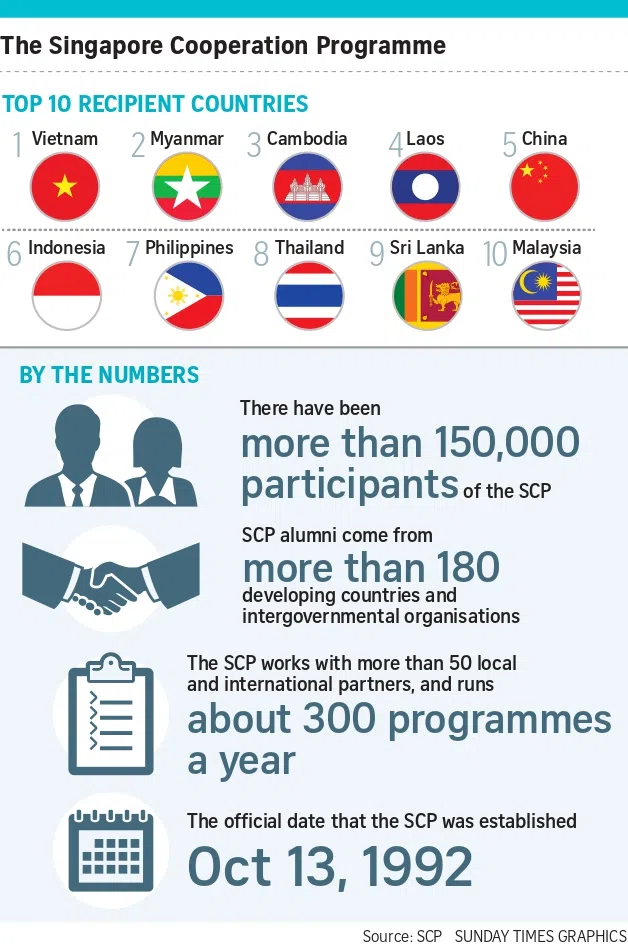30 years of sharing knowledge, making friends and giving back with the S’pore Cooperation Programme
Sign up now: Get ST's newsletters delivered to your inbox

As part of the Singapore Cooperation Programme, foreign officials can sign up for courses that the Government supports.
ST PHOTO: JASON QUAH
SINGAPORE - When Antigua and Barbuda citizen Marion Gertrude O’Reilly-Byron heard that her employer was looking to send someone for a course sponsored under the Singapore Cooperation Programme (SCP), she applied immediately.
One of her colleagues at the Education Ministry in the Caribbean nation had gone for the same course, a training programme for leaders in the technical and vocational education and training field, and had said good things about it.
“As soon as I heard about it, I applied. I didn’t even wait a day,” said Mrs O’Reilly-Byron.
“We have come to recognise that the programmes through the SCP are worthwhile,” she said, noting that Singapore is a leader in many of the fields covered by its programmes.
Mrs O’Reilly-Byron is one of more than 150,000 foreign professionals who have attended courses under the SCP, which marks its 30th anniversary this month. They hail from more than 180 countries, territories and intergovernmental organisations.
Under the SCP, established in 1992 to consolidate various technical assistance programmes offered by Singapore since the 1960s, foreign officials can sign up for courses that the Government supports.
It is a sign of Singapore’s commitment that the programme has been growing.
The SCP’s participant numbers took 15 years from its establishment to hit 50,000 in October 2007. The next 50,000 milestone was reached in eight years in July 2015, with the latest numbers doing the same in seven years.
The SCP courses, which the Ministry of Foreign Affairs conducts together with more than 50 local and international training partners, cover a wide range of subjects, including port management, civil aviation and public governance.
It is a win-win for Singapore, say observers. The programmes are useful for the participants and the SCP benefits the Republic, allowing it to give back to the international community and helping it develop a network of friends and contribute to global prosperity.
Giving back
Singapore could not have developed without members of the international community providing technical assistance and human capital training, said Associate Professor of Law Eugene Tan of Singapore Management University.
He highlighted the help from the World Bank and the Colombo Plan scholarships, which allowed some of Singapore’s early political leaders to study in degree programmes overseas.
Others that Singapore turned to for help included the United Nations Development Programme (UNDP), the International Labour Organisation and the World Health Organisation.
Dutch economist Albert Winsemius, who led a survey by the UNDP, later became the Singapore Government’s chief economic adviser.
“Our economic development and human development indicators would likely be much poorer and slower had Singapore not received help from others. As a fledgling nation-state, we had to learn from others,” said Prof Tan.
Dr Mustafa Izzuddin, a senior international affairs analyst at Solaris Strategies Singapore, describes the SCP as “humane internationalism”.
“Its globally beneficent impact is a testament to Singapore playing the role of a good international citizen despite being a small state,” he said.
In the early years of Singapore’s nationhood, people from different backgrounds and countries shared their expertise to advance Singapore’s economic development and societal resilience, said Ambassador-at-Large at the Ministry of Foreign Affairs Ong Keng Yong.
“We benefited from such advice and experiences. We therefore transmit the same to others in need.”
Prof Tan said what makes the SCP special is its focus on sharing expertise and experience in development, and how it avoids a “prescriptive mindset” that often results in the transplanting of institutions and laws.
“Focusing instead on know-how, SCP participants and their home countries decide for themselves how they want and need to deploy what they have learnt from Singapore. This is a more sustainable model for our international friends,” he added.
A research paper published by the S. Rajaratnam School of International Studies in 2015 said that in lieu of providing direct financial assistance, the SCP shares with other countries Singapore’s experience and expertise.
Such a sharing and training-based approach is better suited for Singapore, observers said.
“Our SCP is very much a manifestation of teaching a person to fish rather than to give handouts of fish. The latter of course is clearly unsustainable,” said Prof Tan.

(From left) Professor Tommy Koh, Foreign Minister Vivian Balakrishnan, former Permanent Secretary Peter Chan, and National Development Minister Sim Ann.
ST PHOTO: ALPHONSUS CHERN
Emeritus Senior Minister Goh Chok Tong gives an example of such an approach in his biography Standing Tall.
He recalled how in 1991, Mr Nelson Mandela, who was South Africa’s president from 1994 to 1999, had asked for Singapore’s help to give US$10 million (S$14 million) to his party, the African National Congress.
He said in his book that funding a political party was wrong as it would be interfering with another country’s politics. What he offered was for Singapore to train ANC officials to prepare them for the governing of South Africa.
When the pair met again some years later after Mr Mandela became president, his country took up Singapore’s offer, and Mr Goh said that South Africa sent many officials for training.
The SCP, then, is also a way to help officials receive training they would need to lead.
For instance, under the programme, Singapore has a $10 million Enhanced Technical Assistance Package for Palestinians – a point Minister in the Prime Minister’s Office and Second Minister for Foreign Affairs Maliki Osman made when he inaugurated the opening of a representative office in Ramallah in October.
Since the package’s inception, more than 600 Palestinian officials have benefited from it by participating in courses on public administration, technical and vocational education and training, and economic development.
The SCP counts Lao President Thongloun Sisoulith, who was in Singapore for a three-month English language course in the late 1990s, among its alumni.
International friends
An added advantage of the SCP is that it helps boost the ties other nations have with Singapore, the observers said.
Those being helped under the SCP will likely remember the kind gesture, and could be more amenable to efforts to boost bilateral trade and investment, said Dr Mustafa.
Mr Ong recounted how he had the opportunity to visit seven different island countries in the South Pacific, and had interacted with their officials who had spent time attending training courses or experiential programmes in Singapore under the SCP.
He said: “They were very appreciative of their learning journeys with Singaporeans.
“Many of them had been promoted to higher posts when they returned home, and felt that their time in SCP exchanges benefited their respective careers.”
Prof Tan said besides developing Singapore’s network of friends internationally, the SCP also allows its trainees to experience what the Republic has to offer and gain a better understanding of how its system works.
“The SCP can bring the world to Singapore and, in return, the participants return knowing Singapore better. In other words, the SCP experience cannot just be about the classroom but very much about imbibing Singapore and what we have to offer.”
Foreign Minister Vivian Balakrishnan said Singapore believes that international cooperation is not a zero-sum game but is mutually beneficial. He also noted that the Republic’s survival is intrinsically linked to global peace and stability.
Speaking at a reception commemorating the 30th anniversary of the SCP on Oct 25, Dr Balakrishnan also highlighted how more than 60 per cent of its participants come from Asean countries.
“When our region is peaceful, prosperous and collectively committed to a sustainable future, we will also create social and economic opportunities for all our people,” he added.
“By working collectively, we strengthen our ability to deal with the immense shared challenges of the future. None of us can address these successfully alone.”
The observers The Sunday Times spoke to agreed that the SCP also allows Singapore to continue learning from others as well.
Mr Ong said that beyond capacity building and knowledge sharing, the programme is a two-way flow, as mutual learning occurs when both sides exchange ideas and experiences.
“For me, Singapore gains first-hand knowledge when our officials network with those from other countries attending training programmes in Singapore.”
The Centre for Livable Cities (CLC), for instance, said it has benefited together with about 650 participants who attended its over 20 SCP programmes since 2015.
Its executive director, Mr Hugh Lim, said that through the programmes, the centre has been able to get a better understanding of the challenges and issues different cities and countries are facing, which allows the CLC to develop better perspectives.
“So when we do a knowledge exchange, we are able to share what our perspectives are. But we also gain a better understanding of how other cities are tackling the same challenge,” he added.




